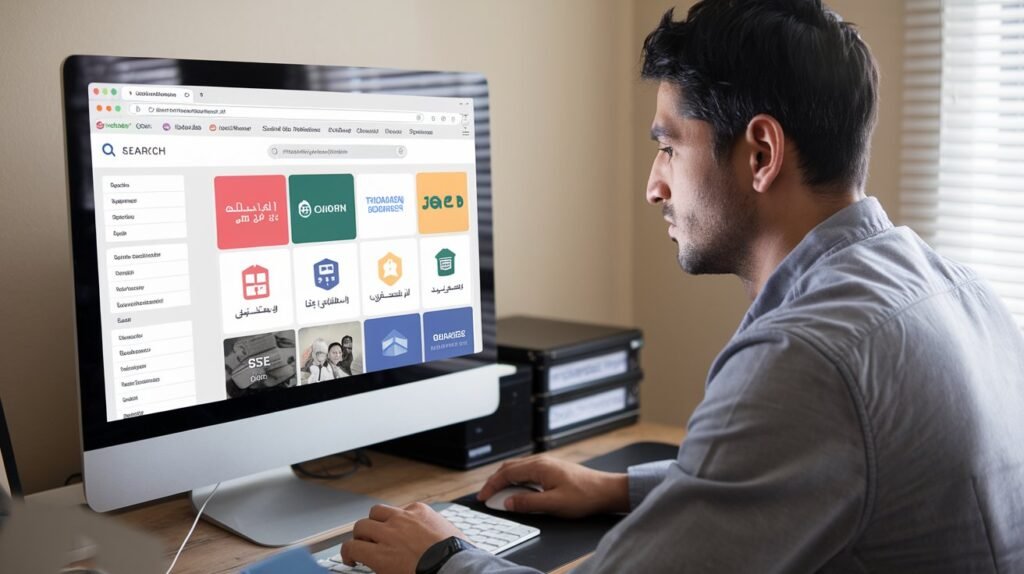
In today’s digital landscape, visibility is everything. While your website may be a masterpiece of design and content, it might still be languishing in the depths of search engine results. Why? The answer often lies beyond your website’s borders, in the realm of off page SEO optimization, especially in competitive markets like Saudi Arabia. As the digital landscape in Saudi Arabia continues to grow, mastering off-page SEO becomes even more crucial for standing out in search engine rankings and reaching your target audience effectively.
Imagine your website as a book in a vast library. On-page SEO ensures the book’s content is top-notch, but off-page SEO is what gets it recommended, talked about, and placed on the ‘must-read’ shelf. From building high-quality backlinks to leveraging social media and content marketing, off-page SEO techniques are the secret weapons that can catapult your site to the top of search rankings. 🚀
But how exactly do you harness the power of off-page SEO? What strategies should you employ to boost your site’s authority and credibility in the eyes of search engines? This comprehensive guide will walk you through 8 essential aspects of off-page SEO, from understanding its fundamentals to measuring your success. Whether you’re a seasoned marketer or a business owner looking to expand your online presence, these insights will help you navigate the complex world of off-page optimization and unlock your website’s true potential.
Understanding Off Page SEO Optimization
A. Definition and importance
Off-page SEO encompasses activities conducted outside of a website to enhance its search engine rankings. These activities primarily focus on building backlinks, fostering branded searches, and boosting social media engagement. The importance of off-page SEO cannot be overstated, as it plays a crucial role in determining a website’s authority and credibility in the eyes of search engines.
Key aspects of off-page SEO include:
- Building high-quality backlinks from authoritative websites
- Generating positive brand mentions across various online platforms
- Engaging in social media marketing to increase visibility and traffic
- Optimizing for local searches through consistent NAP (Name, Address, Phone number) citations
The significance of off-page SEO lies in its ability to influence Google’s ranking algorithm, which heavily relies on external signals to evaluate a website’s reputation and relevance. These signals contribute to the site’s perceived Expertise, Authority, and Trustworthiness (E-A-T), which are vital factors in determining search engine rankings.
B. Differences from on-page SEO
While both on-page and off-page SEO are essential components of a comprehensive SEO strategy, they focus on different aspects of optimization:
| On-Page SEO | Off-Page SEO |
|---|---|
| Focuses on elements within the website | Relies on external signals and activities |
| Involves optimizing content and metadata | Emphasizes building backlinks and brand mentions |
| Directly controlled by website owners | Influenced by external factors and relationships |
| Includes technical optimizations like site speed and structure | Encompasses social media engagement and content marketing |
On-page SEO primarily deals with optimizing the content and structure of individual web pages, while off-page SEO is concerned with improving the website’s overall authority and reputation through external means.
C. Key benefits for website ranking
Off-page SEO offers several crucial benefits that significantly impact a website’s search engine rankings:
- Enhanced credibility: Backlinks from reputable sources signal to search engines that your content is trustworthy and valuable.
- Increased visibility: Social media engagement and brand mentions expand your online presence, leading to more organic traffic.
- Improved E-A-T: Positive reviews, authoritative backlinks, and mentions on trusted platforms boost your site’s perceived expertise and authority.
- Better local visibility: For businesses targeting local customers, off-page SEO techniques like optimizing Google Business Profiles can dramatically improve visibility in local search results.
- Higher domain authority: Acquiring links from trusted “seed sites” and authoritative domains can elevate your website’s overall domain authority.
- Increased brand awareness: Off-page activities like digital PR and influencer marketing can significantly boost brand recognition and searches.
By implementing effective off-page SEO strategies, websites can establish a strong online presence, build trust with their audience, and ultimately achieve higher rankings in search engine results pages (SERPs).
Now that we have covered the fundamentals of understanding off-page SEO, its importance, and how it differs from on-page optimization, we’ll explore the crucial aspect of building high-quality backlinks in the next section. This will delve into specific strategies and techniques for acquiring valuable links that can significantly boost your website’s authority and search engine rankings.
Building High-Quality Backlinks
Now that we have covered the fundamentals of off-page SEO, let’s delve into one of its most critical aspects: building high-quality backlinks. This crucial element of off-page optimization significantly impacts a website’s authority and search engine rankings.
Building High-Quality Backlinks
A. Guest posting strategies
Guest posting remains an effective method for acquiring valuable backlinks. To implement this strategy:
- Identify authoritative websites in your niche
- Pitch unique, high-quality content ideas
- Create comprehensive, value-driven articles
- Include contextual links to your website within the content
When pursuing guest posting opportunities, focus on quality over quantity. Aim for fewer but high-quality backlinks from authoritative and relevant sources.
B. Broken link building
Broken link building is a win-win strategy that benefits both your website and the sites you’re targeting. Here’s how to implement it:
- Use tools like Semrush’s Backlink Audit to identify broken links on competitor websites
- Create content that can serve as a replacement for the broken link
- Reach out to webmasters with concise requests to update the broken link
- Present your content as a valuable alternative
This method not only helps you gain backlinks but also assists other websites in improving their user experience.
C. Skyscraper technique
The Skyscraper technique involves creating superior content based on existing popular topics. To execute this strategy:
- Identify popular content in your niche using backlink analysis tools
- Create more comprehensive, up-to-date, or visually appealing content on the same topic
- Actively promote your enhanced content, especially to those mentioned within it
- Reach out to websites linking to the original content, showcasing your improved version
This approach can significantly enhance your link-building efforts by providing value to both users and potential linking websites.
D. Leveraging influencer relationships
Collaborating with influencers can yield high-quality backlinks and increase brand visibility. Here’s how to leverage these relationships:
- Identify relevant influencers in your industry
- Engage with their content and build genuine relationships
- Collaborate on content creation or offer expert insights
- Seek opportunities for mentions or links in their content
| Influencer Collaboration Type | Potential Benefits |
|---|---|
| Co-created content | Shared audience exposure, multiple backlink opportunities |
| Expert roundups | Increased credibility, diverse backlink sources |
| Product reviews | Targeted audience reach, contextual backlinks |
| Podcast appearances | Brand exposure, link opportunities in show notes |
Remember to focus on building authentic relationships rather than solely pursuing backlinks.
To maximize the effectiveness of these strategies, consider using tools like Ahrefs or SE Ranking to identify and analyze link opportunities. Additionally, creating comprehensive resources such as ultimate guides or free tools can serve as link magnets, attracting backlinks organically.
When implementing these tactics, always prioritize ethical, organic link-building methods over outdated black-hat techniques. This approach ensures long-term success and avoids potential penalties from search engines.
As we move forward, it’s important to recognize that building high-quality backlinks is just one aspect of a comprehensive off-page SEO strategy. In the next section, we’ll explore how social media optimization can complement these link-building efforts and further enhance your website’s visibility and authority in search engine results.
Social Media Optimization

Now that we have covered building high-quality backlinks, it’s essential to explore the power of social media optimization for off-page SEO. While social media signals don’t directly influence search rankings, they play a crucial role in amplifying brand visibility, driving traffic, and indirectly supporting SEO efforts.
Choosing the Right Platforms
Selecting the appropriate social media platforms is crucial for effective optimization. Consider the following factors:
- Target audience demographics
- Platform popularity within your industry
- Content format compatibility (e.g., visual-heavy platforms for image-centric brands)
| Platform | Key Features | Best For |
|---|---|---|
| Wide user base, diverse content formats | General audience engagement | |
| Visual content, Stories, Reels | Brand awareness, product showcases | |
| Professional networking, B2B focus | Industry authority, thought leadership | |
| Real-time updates, concise messaging | News, customer service, trending topics |
Creating Shareable Content
To maximize the impact of social media optimization, focus on producing content that resonates with your audience and encourages sharing:
- Develop high-quality, relevant content that aligns with your brand and audience interests
- Incorporate visual elements such as images, infographics, and videos to increase engagement
- Craft compelling headlines and captions that entice users to click and share
- Utilize trending topics and hashtags to increase visibility and relevance
Engaging with Your Audience
Active engagement is key to building a strong social media presence and fostering brand loyalty:
- Respond promptly to comments, messages, and mentions
- Initiate conversations by asking questions or seeking opinions
- Share user-generated content to encourage community participation
- Host live Q&A sessions or webinars to interact directly with followers
Leveraging Social Signals for SEO
While social signals may not directly impact search rankings, they can indirectly contribute to SEO success:
- Increased brand awareness leads to more branded searches
- Social media sharing can result in more backlinks as content gains visibility
- Enhanced online reputation contributes to overall E-E-A-T (Experience, Expertise, Authoritativeness, and Trustworthiness)
- Social profiles often appear in search results, providing additional brand visibility
To maximize the SEO benefits of social media:
- Ensure consistency in branding across all social platforms
- Optimize social media profiles with relevant keywords and information
- Share blog posts and other website content to drive traffic and potential backlinks
- Monitor social media mentions and engage with users to build relationships and authority
By implementing these social media optimization strategies, brands can significantly enhance their off-page SEO efforts, creating a virtuous cycle of increased visibility, engagement, and authority. With a strong social media presence established, the focus can shift to content marketing for off-page SEO, which will be explored in the next section.
Content Marketing for Off-Page SEO
Now that we have covered the importance of social media optimization in off-page SEO, let’s delve into another crucial aspect: content marketing for off-page SEO.
Content Marketing for Off-Page SEO
Content marketing plays a pivotal role in off-page SEO strategies, serving as a powerful tool to enhance a website’s authority, visibility, and traffic. By creating high-quality, relevant content, businesses can attract and engage their target audience while simultaneously earning valuable backlinks and establishing expertise in their field.
Creating Link-Worthy Content
To succeed in content marketing for off-page SEO, it’s essential to focus on creating link-worthy content. This involves:
- Developing high-quality, informative articles
- Producing long-form content that attracts more links
- Becoming a valuable data source in your industry
- Publishing research-backed content to generate quality backlinks
Long-form content tends to attract more links due to its comprehensive nature and perceived value. By becoming a reliable source of information in your niche, other websites are more likely to reference and link to your content, boosting your off-page SEO efforts.
Developing a Content Distribution Strategy
Creating great content is only half the battle; distributing it effectively is equally important. A robust content distribution strategy should include:
| Distribution Channel | Benefits |
|---|---|
| Guest posting | Enhances visibility and earns backlinks |
| Digital PR | Gains exposure through online public relations |
| Influencer marketing | Leverages credibility of influencers for brand promotion |
| Press releases | Generates mentions and links from news outlets |
Guest posting on authoritative sites not only increases visibility but also contributes to unlinked brand mentions and backlinks. Digital PR focuses on creating compelling stories that attract media attention, leading to increased exposure and valuable backlinks.
Repurposing Content for Multiple Channels
To maximize the impact of content marketing efforts, repurposing content for various channels is crucial. This approach allows for:
- Reaching diverse audience segments
- Increasing the likelihood of backlinks and brand mentions
- Enhancing overall online presence
Some effective ways to repurpose content include:
- Converting long-form articles into infographics or shareable visuals
- Adapting written content for video platforms like YouTube
- Participating in expert roundup posts to gain easy backlinks
- Transforming research data into downloadable reports or whitepapers
By repurposing content, businesses can extend the reach of their message and increase the chances of earning backlinks from various sources. For instance, YouTube marketing can significantly elevate brand signals, leading to increased searches for the brand and potentially more backlinks.
Content marketing for off-page SEO is not just about creating and distributing content; it’s about fostering a strong online presence that search engines recognize as authoritative and trustworthy. By focusing on creating link-worthy content, developing an effective distribution strategy, and repurposing content for multiple channels, businesses can significantly improve their off-page SEO performance.
With this comprehensive approach to content marketing in mind, the next section will explore local SEO techniques, which are crucial for businesses targeting specific geographic areas. These strategies will build upon the foundation laid by content marketing to further enhance a website’s visibility and authority in local search results.
Local SEO Techniques

Now that we have covered content marketing for off-page SEO, let’s explore local SEO techniques that can significantly boost a business’s visibility in local search results.
A. Google My Business Optimization
Optimizing a Google My Business (GMB) profile is crucial for local SEO success. This free tool allows businesses to manage their online presence across Google, including Search and Maps. To maximize GMB effectiveness:
- Ensure all information is accurate and up-to-date
- Add high-quality photos and videos of the business
- Regularly post updates, offers, and events
- Encourage and respond to customer reviews
B. Local Citation Building
Local citations are online mentions of a business’s name, address, and phone number (NAP). Consistent citations across the web signal credibility to search engines. To build a strong citation profile:
- Submit business information to reputable directories
- Ensure NAP consistency across all platforms
- Claim and verify listings on popular review sites
- Monitor and update citations regularly
C. Managing Online Reviews
Reviews play a crucial role in local SEO and customer decision-making. Effective review management involves:
- Actively encouraging satisfied customers to leave reviews
- Responding promptly and professionally to all reviews, both positive and negative
- Addressing concerns raised in negative reviews
- Leveraging positive reviews in marketing materials
D. Geo-targeted Content Creation
Creating location-specific content helps businesses rank for local search queries. Strategies include:
| Content Type | Examples |
|---|---|
| Location Pages | Dedicated pages for each service area |
| Local Blog Posts | Articles about local events or news |
| Area Guides | Comprehensive guides to the local community |
| Location-specific offers | Promotions tailored to local customers |
By implementing these local SEO techniques, businesses can improve their visibility in local search results and attract more nearby customers. This approach complements the broader off-page SEO strategies discussed earlier, such as content marketing and link building.
As we transition to the next section on Brand Mentions and PR, it’s important to note that local SEO efforts often overlap with broader brand-building activities. A strong local presence can lead to increased brand mentions and PR opportunities, further enhancing a business’s overall online visibility and authority.
Brand Mentions and PR
Now that we’ve explored the importance of Local SEO techniques, let’s shift our focus to another crucial aspect of off-page SEO: Brand Mentions and PR.
Brand Mentions and PR
Brand mentions and public relations play a vital role in enhancing off-page SEO efforts. As search engines evolve, they increasingly recognize the significance of brand mentions, both linked and unlinked, in determining a website’s authority and relevance.
Digital PR Strategies
Effective digital PR strategies can significantly boost a brand’s online presence and contribute to improved search engine rankings. Here are some key approaches:
-
Content Creation and Distribution
- Develop high-quality, shareable content
- Leverage infographics and visual content
- Distribute press releases through authoritative channels
-
Influencer Collaborations
- Partner with industry influencers
- Encourage authentic brand endorsements
- Utilize social media platforms for wider reach
-
Media Outreach
- Build relationships with journalists and bloggers
- Offer expert commentary on industry trends
- Participate in interviews and podcasts
| Strategy | Benefits | Challenges |
|---|---|---|
| Content Creation | Increases brand visibility, drives engagement | Requires consistent effort, quality content |
| Influencer Collaborations | Expands reach, builds credibility | Finding relevant influencers, maintaining authenticity |
| Media Outreach | Enhances brand authority, generates quality mentions | Time-consuming, requires strong networking skills |
Leveraging Unlinked Brand Mentions
Unlinked brand mentions, while not providing direct backlinks, still offer significant value for off-page SEO:
- Increase brand visibility and recognition
- Contribute to overall online reputation
- Serve as potential indicators of brand authority for search engines
To leverage unlinked mentions:
- Monitor brand mentions across various platforms using tools like Google Alerts, Mention, or Brand24
- Analyze the sentiment and context of mentions
- Reach out to content creators to convert unlinked mentions into backlinks when appropriate
- Encourage positive mentions through exceptional products, services, and customer experiences
Building Relationships with Journalists and Bloggers
Establishing strong connections with media professionals is crucial for effective PR and off-page SEO:
- Personalize outreach efforts
- Provide value through exclusive insights or data
- Respond promptly to media inquiries
- Maintain regular, non-promotional communication
By fostering these relationships, brands can:
- Secure more frequent and higher-quality media coverage
- Gain opportunities for expert commentary and thought leadership
- Increase the likelihood of positive brand mentions and backlinks
It’s important to note that while backlinks remain valuable, the growing influence of brand mentions highlights a shift in SEO strategy. A robust online presence now depends not only on links but also on the broader conversation surrounding a brand, reflecting its reputation and trustworthiness in the eyes of both search engines and users.
As we move forward, the next section will explore the importance of Forum and Community Engagement in off-page SEO, building upon the foundation of brand mentions and PR strategies discussed here.
Forum and Community Engagement
Now that we have covered the importance of brand mentions and PR in off-page SEO, let’s delve into another crucial aspect: forum and community engagement. This strategy complements brand mentions by providing opportunities for direct interaction with potential customers and industry peers.
Identifying Relevant Online Communities
To maximize the impact of forum and community engagement, it’s essential to:
- Research platforms where the target audience congregates
- Analyze industry-specific forums and discussion boards
- Identify social media groups focused on relevant topics
- Explore Q&A sites like Quora or Stack Exchange
| Platform Type | Examples | Benefits |
|---|---|---|
| Industry Forums | Reddit, Niche-specific boards | Direct engagement with enthusiasts |
| Social Media Groups | LinkedIn, Facebook Groups | Wider audience reach |
| Q&A Sites | Quora, Stack Exchange | Opportunity to showcase expertise |
Providing Valuable Contributions
Effective community engagement revolves around offering genuine value to the community. This can be achieved by:
- Sharing insights that address community needs
- Offering solutions to common problems
- Providing up-to-date information on industry trends
- Engaging in meaningful discussions with other members
Consistency is key in establishing trust and authority within these communities. Regular participation helps build relationships and increases visibility over time.
Building Authority Through Expert Answers
To establish oneself as an authority figure:
- Focus on topics within areas of expertise
- Provide comprehensive, well-researched responses
- Back up claims with credible sources and data
- Share personal experiences when relevant
By consistently offering high-quality, insightful answers, it’s possible to gain recognition as a thought leader in the field. This recognition can lead to increased visibility and potentially valuable backlinks from other community members.
Avoiding Spammy Practices
While forum and community engagement can be powerful for off-page SEO, it’s crucial to avoid practices that may be perceived as spammy:
- Don’t overtly promote products or services
- Avoid excessive self-linking
- Refrain from posting irrelevant content
- Don’t engage in aggressive or confrontational behavior
Instead, focus on building genuine relationships and providing value to the community. This approach is more likely to result in organic content sharing and natural link-building opportunities.
Community engagement also plays a significant role in generating user-generated content (UGC), which can further enhance off-page SEO efforts. By encouraging discussions and facilitating interactions, businesses can create a more dynamic online presence that search engines view favorably.
As we transition to the next section on monitoring and measuring off-page SEO success, it’s important to note that community engagement efforts should be tracked and analyzed. This data-driven approach allows for refinement of strategies and optimization of engagement efforts. With this in mind, next, we’ll explore how to effectively measure the impact of various off-page SEO techniques, including forum and community engagement.
Monitoring and Measuring Off-Page SEO Success
Now that we have covered forum and community engagement, let’s delve into the crucial aspect of monitoring and measuring the success of your off-page SEO efforts. Effective tracking and analysis of your strategies are essential for optimizing your overall SEO performance.
Key metrics to track
To gauge the effectiveness of your off-page SEO initiatives, it’s important to focus on several key metrics:
-
Organic Traffic: This metric indicates the number of non-paid clicks from search engines. An upward trend in organic traffic suggests successful SEO efforts.
-
Keyword Rankings: Monitor your positioning for important search terms to assess your visibility in search results.
-
Search Visibility: This measures the percentage of clicks for tracked keywords landing on your site, providing insights into your market share.
-
Traffic Value: Quantifies the cost of organic clicks if they were paid, highlighting the importance of ranking for high-intent “money keywords.”
-
Organic Traffic Conversions: Tracks significant user actions, directly connecting SEO efforts to revenue.
-
Referring Domains: Indicates the number of external sites linking back to your website, crucial for link-building success.
-
Indexed Pages: Reflects your site’s visibility in search engines.
-
Core Web Vitals: Assesses user experience through metrics like loading speed and interactivity, which affect ranking.
| Metric | Description | Importance |
|---|---|---|
| Organic Traffic | Non-paid clicks from search engines | Indicates overall SEO success |
| Keyword Rankings | Positioning for important search terms | Measures visibility in search results |
| Search Visibility | Percentage of clicks for tracked keywords | Provides insights into market share |
| Traffic Value | Cost of organic clicks if paid | Highlights importance of high-intent keywords |
| Organic Conversions | Significant user actions | Direct connection to revenue |
| Referring Domains | Number of external sites linking back | Crucial for link-building success |
| Indexed Pages | Site’s visibility in search engines | Reflects overall search presence |
| Core Web Vitals | User experience metrics | Affects ranking and user satisfaction |
Tools for off-page SEO analysis
To effectively monitor these metrics, several tools are available:
- Google Analytics: Essential for tracking on-site metrics such as sessions, average time on page, page views, and conversions.
- Ahrefs’ Site Audit: Provides a Health Score indicating the overall state of technical SEO.
- Link Explorer: Analyzes backlinks and site influence, allowing research and comparison of website popularity and backlink profiles.
- Google Search Console: Offers insights into index coverage errors and Core Web Vitals.
Adjusting strategies based on performance
Monitoring these metrics allows for data-driven adjustments to your off-page SEO strategies:
- Content Optimization: If certain pages receive more views, create similar content to expand reach.
- Link Building Focus: Adjust efforts based on the quality and quantity of referring domains.
- User Experience Improvements: Address Core Web Vitals issues to enhance rankings and user satisfaction.
- Keyword Strategy Refinement: Focus on high-value keywords that drive conversions and traffic value.
- Local SEO Adjustments: For businesses targeting local customers, optimize based on local search performance metrics.
It’s crucial to interpret these metrics in context, as some commonly mentioned SEO metrics like bounce rate and average session duration can be misleading if misinterpreted. The goal is to demonstrate tangible business outcomes from your SEO initiatives.
By consistently monitoring these KPIs and making informed adjustments, you can refine your off-page SEO strategies effectively, ensuring they align with your overall business objectives and contribute to improved search engine rankings and online visibility.
Off-page SEO optimization is a crucial aspect of any comprehensive digital marketing strategy. By focusing on building high-quality backlinks, leveraging social media platforms, and implementing effective content marketing techniques, businesses can significantly enhance their online visibility and authority. Local SEO tactics, brand mentions, and PR efforts further contribute to a robust off-page SEO framework.
Engaging in forums and communities provides opportunities to establish expertise and build relationships within target audiences. Ultimately, the success of off-page SEO efforts hinges on consistent monitoring and measurement. By tracking key metrics and adjusting strategies accordingly, businesses can ensure their off-page optimization efforts yield tangible results in terms of improved search rankings, increased organic traffic, and enhanced brand credibility. Embracing these off-page SEO techniques empowers businesses to stay competitive in the ever-evolving digital landscape and maximize their online potential.





